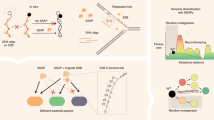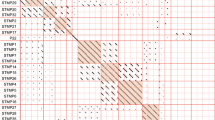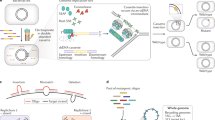Abstract
Early attempts to generate new restriction specificities by recombination between allelic restriction-modification systems have been unsuccessful1. Bullas et al.2 succeeded in isolating a new specificity, SQ, in Salmonella that they interpreted as being the result of a recombination event between the parental strains, Salmonella typhimurium and S. potsdam, which encode the SB and SP restriction systems, respectively. This interpretation has recently been confirmed by DNA heteroduplex studies with the SB, SP and SQ structural genes3. We have determined the DNA sequences recognized by the SB and SP enzymes4 and found that, like all type I restriction sequences, they are split into two specific domains by a spacer of nonspecific sequence that, for both SB and SP, is 6 base pairs (bp) long. We have now determined the sequence recognized by the recombinant SQ enzyme and find that it is a hybrid between the SB and SP sequences, containing one specific domain from each parental strain. This result implies that each of the two specific domains is recognized by a physically distinct part of the enzyme.
This is a preview of subscription content, access via your institution
Access options
Subscribe to this journal
Receive 51 print issues and online access
$199.00 per year
only $3.90 per issue
Buy this article
- Purchase on Springer Link
- Instant access to full article PDF
Prices may be subject to local taxes which are calculated during checkout
Similar content being viewed by others
References
Arber, W. & Linn, S. A. Rev. Biochem. 38, 467–500 (1969).
Bullas, L. R., Colson, C. & Van Pel, A. J. gen. Microbiol. 95, 166–172 (1976).
Fuller-Pace, F. V., Bullas, L. R., Delius, H. & Murray, N. E. Proc. natn. Acad. Sci. U.S.A. 81, 6095–6099 (1984).
Nagaraja, V., Shepherd, J. C. W., Pripfl, T. & Bickle, T. A. J. molec. Biol. 182, 579–587 (1985).
Sanger, F., Coulson, A. R., Hong, G. F., Hill, D. F. & Petersen, G. B. J. molec. Biol. 162, 729–773 (1982).
Bajwa, W., Meyhack, B., Rudolph, H., Schweingruber, A. M. & Hinnen, A. Nucleic Acids Res. 12, 7721–7739 (1984).
Sengstag, C. & Arber, W. EMBO J. 2, 67–71 (1983).
Chan, P. T., Ohmori, H., Tomizawa, J.-I. & Lebowitz, J. J. biol Chem. (in the press).
Dunn, J. J. & Studier, F. W. J. molec. Biol. 166, 477–535 (1983).
Sadler, I., Suda, K., Schatz, G., Kaudewitz, F. & Haid, A. EMBO J. 3, 2137–2143 (1984).
Bickle, T. A. in The Nucleuses (eds Linn, S. & Roberts, R. J.) 85–108 (Cold Spring Harbor Laboratory, New York, 1982).
Cough, J. A. & Murray, N. E. J. molec. Biol. 166, 1–19 (1983).
Arber, W. & Kühnlein, U. Path. Microbiol. 30, 946–952 (1967).
Krüger, D. H. & Bickle, T. A. Microbiol. Rev. 47, 345–360 (1983).
Author information
Authors and Affiliations
Rights and permissions
About this article
Cite this article
Nagaraja, V., Shepherd, J. & Bickle, T. A hybrid recognition sequence in a recombinant restriction enzyme and the evolution of DNA sequence specificity. Nature 316, 371–372 (1985). https://doi.org/10.1038/316371a0
Received:
Accepted:
Issue Date:
DOI: https://doi.org/10.1038/316371a0
This article is cited by
-
Restriction endonucleases: natural and directed evolution
Applied Microbiology and Biotechnology (2012)
-
Mutational analysis of the conserved domains of a T-region border repeat of Agrobacterium tumefaciens
Plant Molecular Biology (1989)
Comments
By submitting a comment you agree to abide by our Terms and Community Guidelines. If you find something abusive or that does not comply with our terms or guidelines please flag it as inappropriate.



